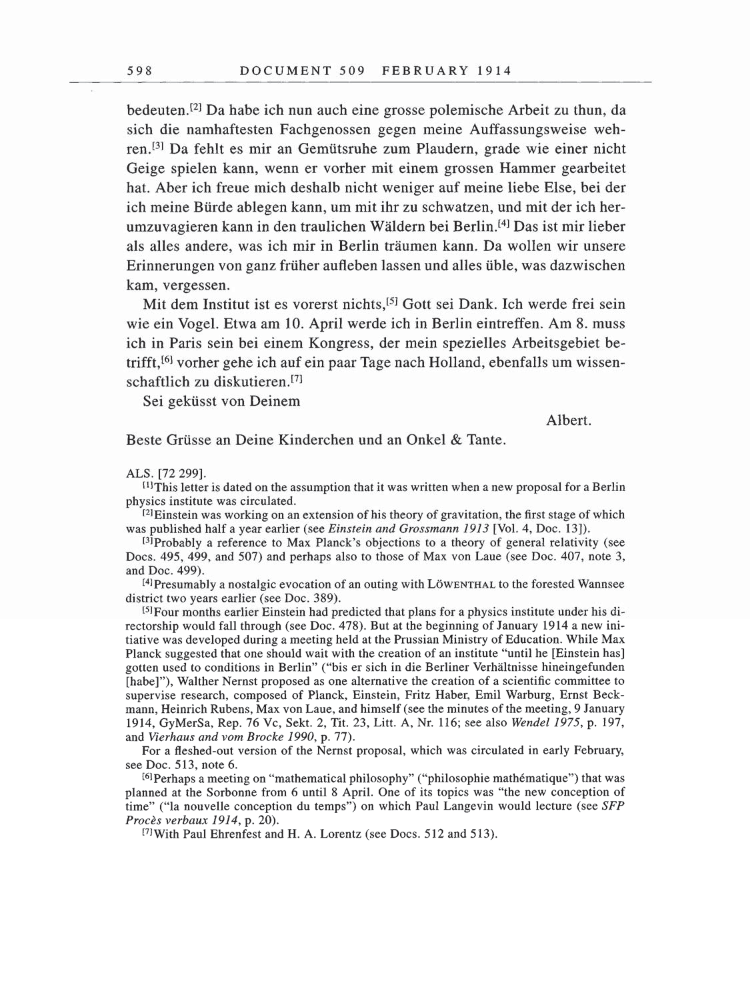598 DOCUMENT 509 FEBRUARY 1914 bedeuten.[2] Da habe ich nun auch eine grosse polemische Arbeit zu thun, da sich die namhaftesten Fachgenossen gegen meine Auffassungsweise weh- ren.[3] Da fehlt es mir an Gemütsruhe zum Plaudern, grade wie einer nicht Geige spielen kann, wenn er vorher mit einem grossen Hammer gearbeitet hat. Aber ich freue mich deshalb nicht weniger auf meine liebe Else, bei der ich meine Bürde ablegen kann, um mit ihr zu schwatzen, und mit der ich her- umzuvagieren kann in den traulichen Wäldern bei Berlin.[4] Das ist mir lieber als alles andere, was ich mir in Berlin träumen kann. Da wollen wir unsere Erinnerungen von ganz früher aufleben lassen und alles üble, was dazwischen kam, vergessen. Mit dem Institut ist es vorerst nichts,[5] Gott sei Dank. Ich werde frei sein wie ein Vogel. Etwa am 10. April werde ich in Berlin eintreffen. Am 8. muss ich in Paris sein bei einem Kongress, der mein spezielles Arbeitsgebiet be- trifft,[6] vorher gehe ich auf ein paar Tage nach Holland, ebenfalls um wissen- schaftlich zu diskutieren.[7] Sei geküsst von Deinem Albert. Beste Grüsse an Deine Kinderchen und an Onkel & Tante. ALS. [72 299]. [1]This letter is dated on the assumption that it was written when a new proposal for a Berlin physics institute was circulated. [2]Einstein was working on an extension of his theory of gravitation, the first stage of which was published half a year earlier (see Einstein and Grossmann 1913 [Vol. 4, Doc. 13]). [3]Probably a reference to Max Planck's objections to a theory of general relativity (see Docs. 495, 499, and 507) and perhaps also to those of Max von Laue (see Doc. 407, note 3, and Doc. 499). [4]Presumably a nostalgic evocation of an outing with Löwenthal to the forested Wannsee district two years earlier (see Doc. 389). [5]Four months earlier Einstein had predicted that plans for a physics institute under his di- rectorship would fall through (see Doc. 478). But at the beginning of January 1914 a new ini- tiative was developed during a meeting held at the Prussian Ministry of Education. While Max Planck suggested that one should wait with the creation of an institute "until he [Einstein has] gotten used to conditions in Berlin" ("bis er sich in die Berliner Verhältnisse hineingefunden [habe]"), Walther Nernst proposed as one alternative the creation of a scientific committee to supervise research, composed of Planck, Einstein, Fritz Haber, Emil Warburg, Ernst Beck- mann, Heinrich Rubens, Max von Laue, and himself (see the minutes of the meeting, 9 January 1914, GyMerSa, Rep. 76 Vc, Sekt. 2, Tit. 23, Litt. A, Nr. 116 see also Wendel 1975, p. 197, and Vierhaus and vom Brocke 1990, p. 77). For a fleshed-out version of the Nernst proposal, which was circulated in early February, see Doc. 513, note 6. [6]Perhaps a meeting on "mathematical philosophy" ("philosophie mathematique") that was planned at the Sorbonne from 6 until 8 April. One of its topics was "the new conception of time" ("la nouvelle conception du temps") on which Paul Langevin would lecture (see SFP Proces verbaux 1914, p. 20). [7]With Paul Ehrenfest and H. A. Lorentz (see Docs. 512 and 513).
